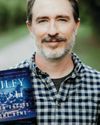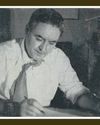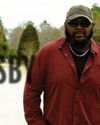
To be periodically rediscovered means one has been periodically forgotten. It’s odd to think of Collier as forgotten, since during his lifetime his stories appeared in high profile magazines like The New Yorker and were frequently anthologized and adapted for radio and television shows such as Suspense and The Twilight Zone. Although cultural memory is short, there are other reasons.
Part of Collier’s relative anonymity is because his oeuvre has attracted little critical attention. Betty Richardson, the author of the only book to date on Collier, adduces several arguments for this neglect. Collier’s most active decades as a writer, the 1930s and 1940s, favored work with political and social themes like John Steinbeck’s The Grapes of Wrath and James T. Farrell’s Studs Lonigan trilogy. As someone who dabbled in fantasy and crime, Collier was simply not “relevant.”
Collier’s hallmarks—a bemused and skeptical view of humanity, a tendency to the allegorical and the timeless, a subtle yet effective use of language, sheer charm—are not generally prized by academia. There was no magnum opus, no sprawling, ambitiously overstuffed novel, merely a series of elegantly constructed stories—“wayward miniatures,” in the words of Anthony Burgess. Collier was also a genuinely modest individual, uncomfortable with the limelight and surprised that anyone would be interested in him.
None of this figures into a recipe for literary survival. Yet Collier endures. Against the odds his curiously enticing creations continue to find appreciative readers.
This story is from the Summer #168 2021 edition of Mystery Scene.
Start your 7-day Magzter GOLD free trial to access thousands of curated premium stories, and 9,000+ magazines and newspapers.
Already a subscriber ? Sign In
This story is from the Summer #168 2021 edition of Mystery Scene.
Start your 7-day Magzter GOLD free trial to access thousands of curated premium stories, and 9,000+ magazines and newspapers.
Already a subscriber? Sign In

6 New Writers to Watch
Wiley Cash’s debut, A Land More Kind Than Home, about the bond between two brothers landed on the New York Times Best Sellers List and received the Crime Writers’ Association Debut of the Year.

ANN CLEEVES
British author Ann Cleeves has an affinity for remote areas and how these isolated regions affect her characters.

CARLENE O'CONNOR
“Anyone can play Snow White. It takes real talent to play the Wicked Witch.”

Mystery Scene MISCELLANY
FIRST USE OF FINGERPRINTS

PANIC ATTACK
The newest entry in my Pittsburgh set series of thrillers is called Panic Attack. It’s the sixth book featuring Daniel Rinaldi, a psychologist and trauma expert who consults with the Pittsburgh Police.

LAIDLAW'S LEGACY
During the pandemic, Ian Rankin stepped away from Rebus and into the shoes of friend and literary hero, the “Godfather of Tartan Noir” William McIlvanney.

HILARY DAVIDSON
Call it The Case of Life Imitating Art.

Thomas Walsh - The Unusual Suspect
Any paternity test on the sub-genre of police procedural will identify the DNA of Ed McBain and Lawrence Treat, as well as the 1948 movie The Naked City and the radio and TV series Dragnet…and of course Thomas Walsh.

S.A. COSBY
In Razorblade Tears, two aging men—one Black, one white, both with criminal pasts—join forces to seek revenge for the murders of their gay sons. The themes of fathers and sons and toxic masculinity will be familar to fans of Cosby’s 2020 breakout Blacktop Wasteland.

VIPER'S NEST OF LIES
A slip of the tongue is a dangerous thing. Not only does it expose indiscretions, it also can lead to murder. The latter especially applies to me.